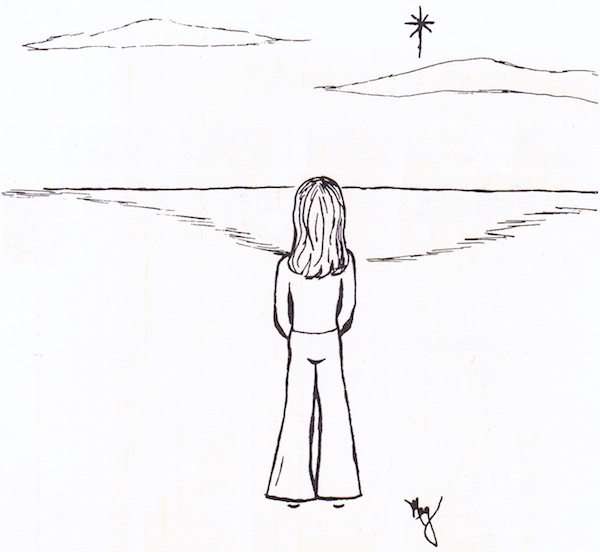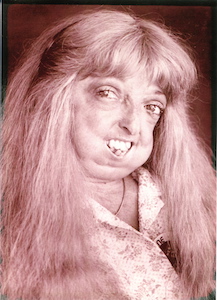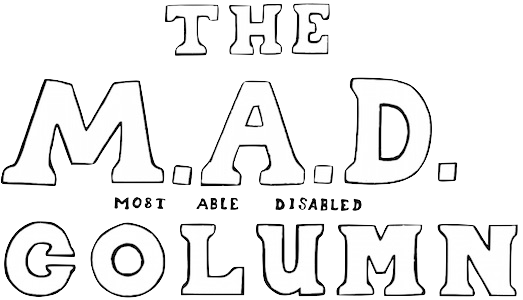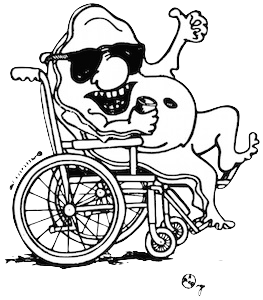
Meg Casey gazing skyward
by Meg Casey
Handicapped Acceptance
The Disabled Mirror
August 29 1984
Out of all the interviews I've had one particular person and her question stands out in my memory the most.
The hostess introduced the segment of the telecast in which I appeared by warning her audience that what they were about to show "might be difficult to watch" (me) but advised them to "at least 'try' to listen" because she thought there was "a message to come out of it from a which we might all learn."
Let me insert hear that – as a whole – the rest of the interview did not come off so badly – but one question asked by the woman resonated with me.
"In this world where beauty means everything, how do you see yourself, Meg, when you look in your mirror?"
My answer at the time was that "I see my image as I have always recognized myself."
I have elaborated and expanded upon that answer many, many times in my head up since then, wishing that words at the time could have been made right then to explain what I really meant in that short statement to her.
I have always been loved well and have known it. Therefore, I have always known my worth. Or as the Skin Horse once said to the Velveteen Rabbit: "When you are real you don't mind being hurt … but once you are Real you can't become unreal. It lasts for always."
From the Velveteen Rabbit
by Margory Williams
Accepting A Handicap
January 19 1983
How long does it take to accept one's handicap. Or do you at ever accept it?
Is counseling suggested?
This is the sort of question that I shall have to answer from a personal viewpoint because I'm not so sure that a person ever accepts a handicap. They might discipline themselves into dealing with the reality of it but what they learn to accept its "unchangeableness."
I am 27 seven years old and it wasn't until a couple of years ago that I could even use the word in relation to myself without gagging on it first. And I consider myself pretty well-adjusted. The labels are limiting; the condition is bad enough.
I would in fact say that my life, for the most part, has been stylized "to spite" my handicap and those whose thinking might restrict me within the boundaries of its definition.
It was vitally important in my development that I proved to myself – by proving to the world – that I was just as capable of achieving goals as anyone else, if not more so. Only after success could I look at the word – handicap – and see what it truly was, a word.
Words only have as much punch as we allow them. It is the amount of faith which person has in his or her own self-worth that drives him or her to do great things. That golden word is confidence.
Is counseling suggested?
Yes. Both peer and Department of Vocational Rehabilitation counseling. Especially in the teenage years when peer pressure is at its toughest and fitting in, by physical makeup or decoration is so essential.
Everyone relates to high school war stories and the traumas of being accepted into the "crowd," regardless of differences in sex and age.
To have had someone available to talk with about my hurt and confused feelings at that age – like a peer counselor - might have been a comfort to me. Perhaps it might have made it easier to get through because those are undoubtedly the hardest years.
A peer counselor is someone who is on the same level as you, in this case physically. That counselor need not have to same disability of the counselee, unless it is requested. Together they share experiences and hopefully the person being counseled is able to learn the ropes of the game from someone who has gone through it already. If no answers are known they can be searched for together.
In the later years of high school the counseling of the Department of Vocational Rehabilitation would help a disabled student to look at all the fields of study available and choose appropriately for his or her particular situation D.V.R. also helps with the funding of educational training.



